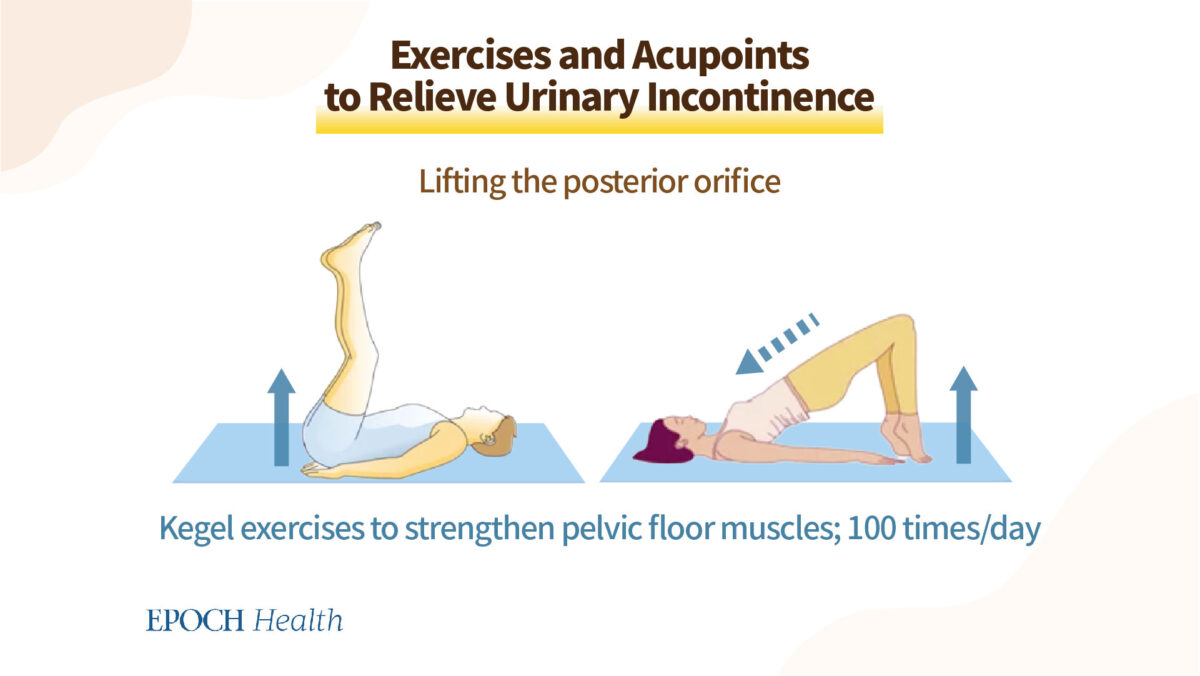


Urinary incontinence (also known as involuntary urination, or urinary leakage) is a common and sometimes embarrassing problem that increases in frequency as we age and with organ function deterioration.
According to a 2019 review of research published in the periodical Primary Care: Clinics in Office Practice, approximately 20 million women and 6 million men in the United States experience urinary incontinence during their lifetime.
Jonathan Liu, a professor of traditional Chinese medicine (TCM) at a Canadian public college, explained how to prevent and improve urinary incontinence symptoms by changing daily life habits and diet in the “Health 1+1” program, and shared several methods for treatment.
According to TCM theory, the kidneys oversee the opening and closing of the front and back of the genitals, which in effect control the anus and urethra. If an elderly person suffers from urine leakage, it implies there is a problem with the organs that close the bladder and bowels. In other words, it is an indication of the deficiency of kidney qi, also called “weak kidneys” in TCM context, which is closely related to the aging of the human body.
“Qi” in TCM can be interpreted as the “energy” or “vitality” that constitutes the life of the human body. This energy flows throughout the body to maintain all physiological activities.
Liu said that TCM divides weak kidneys into two types, kidney yang deficiency and kidney yin deficiency, and the symptoms are quite different.
Kidney yang deficiency means a shortage in kidney energy, and in this state, the kidneys cannot function normally. Symptoms include:
- Sensation of cold: chills in the whole body or part of it, such as cold knees.
- Lumbar soreness: cannot bear a heavy load, becomes fatigued easily, the waist can hardly bear even light jobs.
- Frequent nocturia and clear urine: waking during the night needing to urinate.
- Fatty and bulging tongue: The kidneys are related to the body’s water metabolism. When the kidney qi is insufficient, it cannot metabolize water properly, making it easy to accumulate in the tongue, resulting in a fat, bulging, and pale tongue.
- Seldom feel thirsty.
- Weak pulse: slow heart rate.
Kidney yin deficiency means there exists a certain amount of “submerged heat” in the body, resulting in a relative deficiency of kidney yin fluid. The symptoms include:
- Dry throat and bitter mouth.
- Backache, often accompanied by night sweats.
- Red tongue and less tongue coating than normal.
- Tinnitus.
- Get angry easily.
Liu said that the above symptoms are all possible symptoms in patients with urinary incontinence.
In addition to age, he also cites other factors that may contribute to urinary incontinence, including:
- For women after childbirth, the muscles of the pelvic floor are expanded and loosened.
- Prostatic hyperplasia in men causes difficulty in urinating and incomplete urination, resulting in leakage later.
- The effects of diseases and drugs, such as diabetes, which tend to accelerate the aging of nerves and cause decline of urination function.
- Muscular dystrophy, resulting in the reduction of pelvic floor muscle strength.
So how does one treat leaking urine? Liu suggested improvement can be achieved through a multi-faceted treatment with Chinese medicine, diet, and acupoint massaging.
- With Chinese medicine: Ba Xian Chang Shou Pills (Ophiopogon, Schizandra & Rehmannia combination) can be used for those with kidney yin deficiency, and Sang Piao Xiao San (Mantis eggshell powder) for those with kidney yang deficiency.
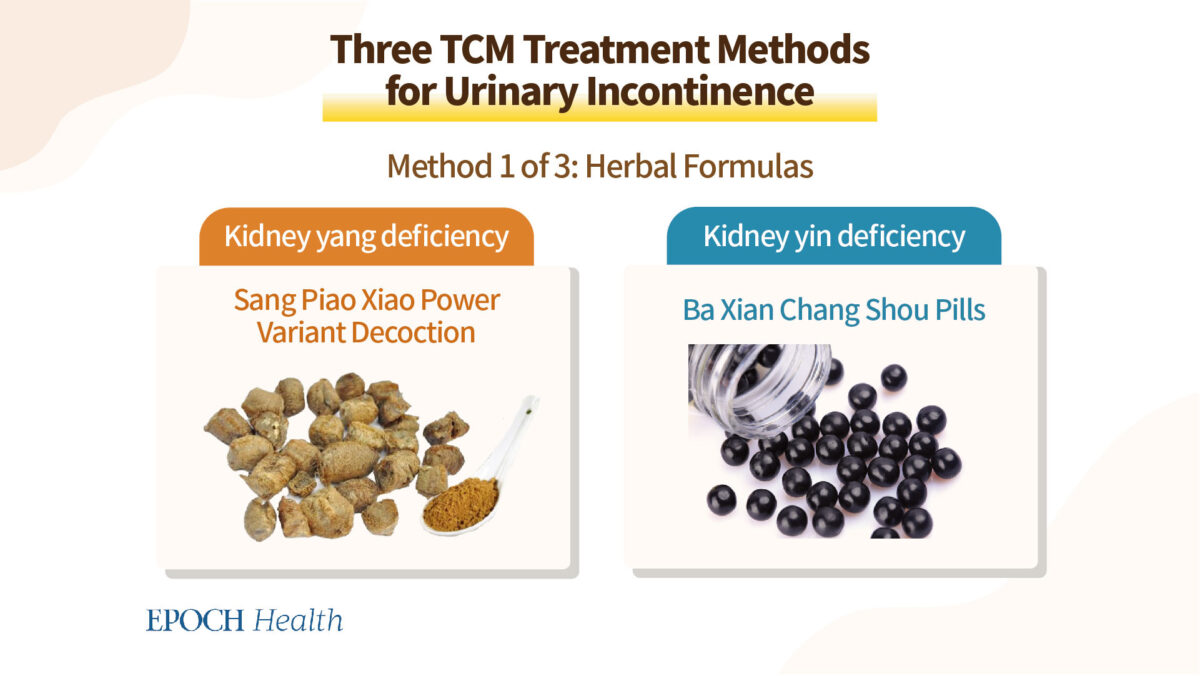
(The Epoch Times) - Diet therapy: Gorgon Euryale seed 30 grams (1.1 ounces), 5-8 pieces of Ginkgo biloba, Wolfberry 15 grams (0.55 ounces), white rice 250 grams (8.8 ounces), put all together and cook into a porridge, serve 2-3 times a week.
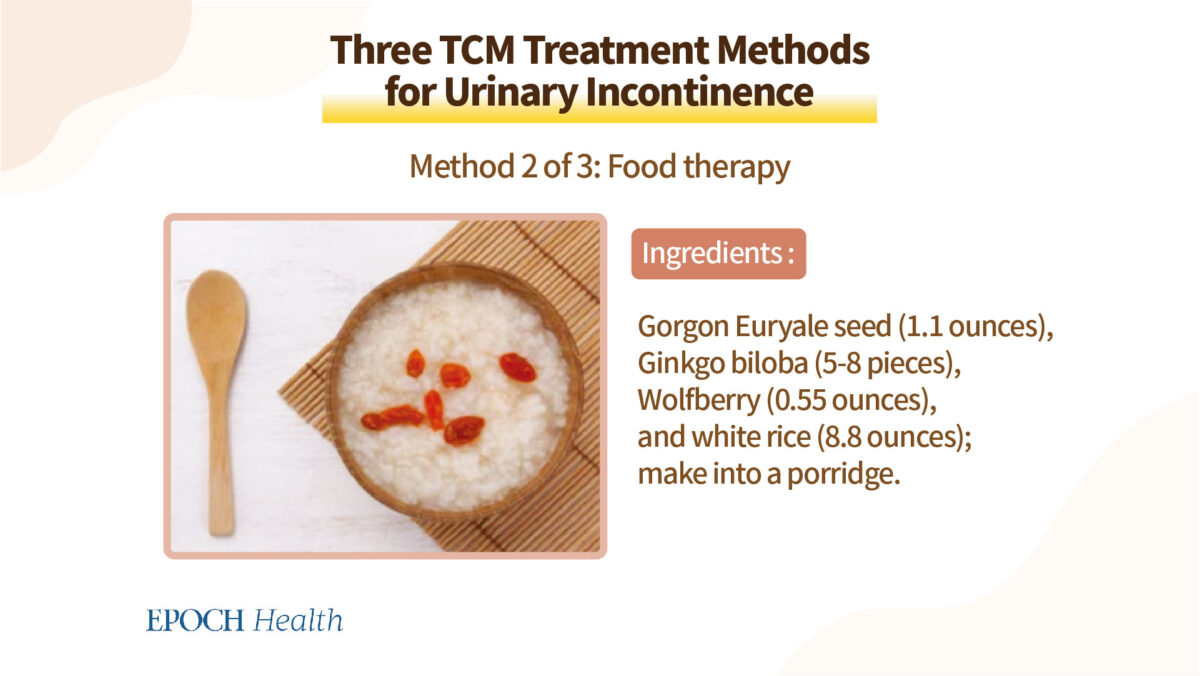
(The Epoch Times) - Acupoints: massage Guanyuan, Zhongji, Shuidao, Sanyinjiao, Taixi, Yongquan and other acupoints.
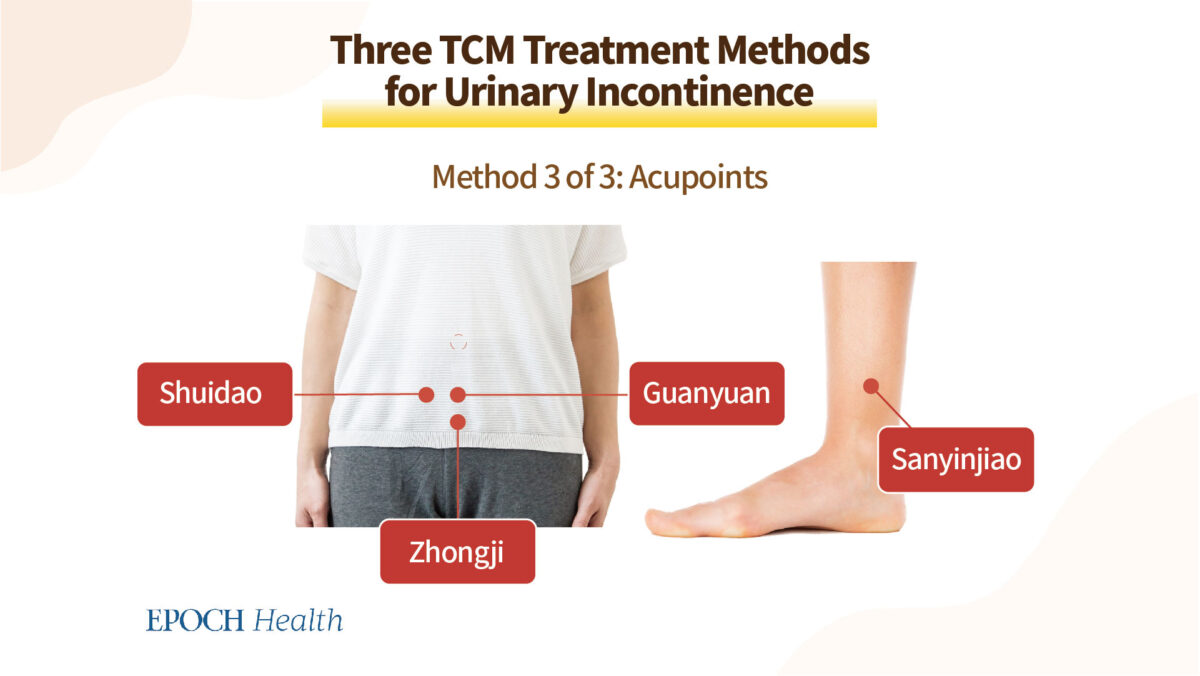
(The Epoch Times) 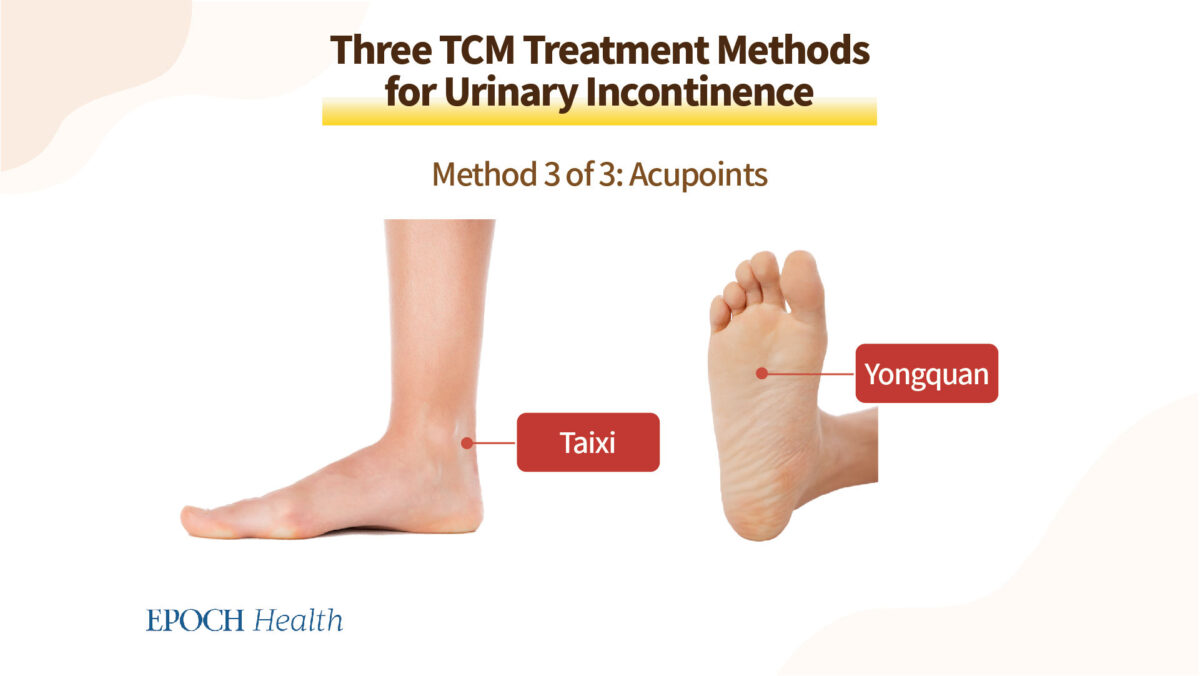
(The Epoch Times)
Acupoints refer to special points on the meridian lines of the human body, mostly where there are many nerve endings and blood vessels.
According to TCM theory, meridians are the channels of energy in the human body. There are 12 meridians corresponding to the 12 viscera, which run from the viscera to the hands, feet, head, and face. TCM can treat diseases by stimulating the corresponding meridian points through massage, patting, acupuncture, and the like.
In addition, women who have given birth multiple times have a higher chance of leaking urine in the future, and many of them might have already shown signs of that. Liu suggested that these people should practice “prevent before it occurs” in daily life, and pay attention to the following:
- Avoid drinking coffee.
- Avoid drinking alcohol. Alcohol will not only increase the amount of each urination but also generate internal heat, which will damage the yin (it will make the body burn and damage the kidney energy) and hinder normal kidney function.
- Avoid spicy, irritating foods, such as Sichuan peppercorn, and pepper.
- Avoid cold food. Cold food can damage the kidney qi. If the external is cold and the body inside is also cold, it will cause great damage to the kidney function. So, all cold foods—ice cream, ice cubes, ice water, and iced tea must not be taken in excess.
- Sexual intercourse should be moderate. TCM believes that the kidneys store essence and excessive intercourse will damage the kidneys, and poor kidney function will lead to loose urine retention.
In terms of diet therapy on normal days, Liu encourages everyone to eat more of the following:
- Oysters: can nourish blood and increase kidney yin (improve kidney function). In addition, oysters are rich in animal protein, which can increase bladder tension.
- Scallops: rich in animal protein and low in fat, can increase tissue immune function, promote immune recovery, and help relieve symptoms of urinary incontinence.
- Mushrooms: low in calories and contain iron, calcium, and other trace elements, which can provide sufficient nutrition for the bladder mucosa and nerve tissue.
- Wolfberry and Chinese yam: Both have the function of nourishing the kidneys.
Liu also said that exercise can help prevent and relieve urine incontinence too. Kegel exercises can be used to train the pelvic floor muscles, and the effect is quite remarkable when done 100-200 times a day. Because the pelvic floor muscles are located at the intersection of Ren and Du meridians, with the Changqiang acupoint of the Du meridian in behind, and the Huiyin acupoint of the Ren meridian in the front. These two main meridians are too hidden and are seldom accessed by acupuncture in general. Strengthening and stimulating these two acupoints through Kegel exercises can help improve the leakage of urine.
*Some herbs mentioned in this article may be unfamiliar, but they are generally available in Asian supermarkets.
Note: Because different people have different physiques, it is recommended to consult your doctor or TCM experts.

